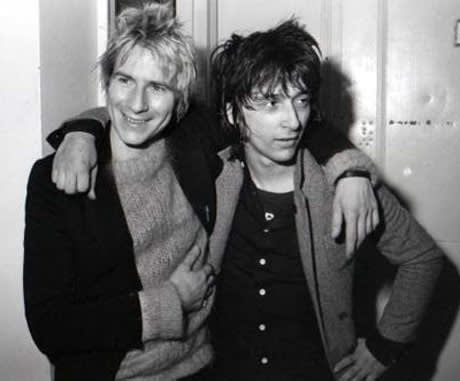The New York Dolls are accepted as one of punk's opening shots, the bridge between classic rock'n'roll pretence and the anarchic, snot-nosed cacophony that would eventually capture the public's imagination. Yet even the band's closest confidants and members themselves have admitted that their recorded output was never wholly representative of the group, giving the Dolls an air of "you had to be there..." mystique.
But their influence was never limited to the musicians who would gather around CBGBs and Max's Kansas City in New York and London's own fledgling punk scene. The Dolls' enigmatic guitarist, Johnny Thunders, was prodigiously talented both in terms of playing and his ability to get fucked up. He was often cast as the Keith Richards to David Johansen's Mick Jagger — likely a motivating factor in his adoption as an idol by L.A. Sunset Strip heroes like Guns 'n' Roses — while his songwriting inspired a legion of like-minded, hard-scrabble songwriters like Jesse Malin and Ryan Adams.
Thunders' legend tends to end in the '70s, with the disillusionment of the Heartbreakers, yet another legendary band whose recordings failed to capture the manic energy of their performances. But Thunders recorded a number of solo albums with varying degrees of input from London and New York punk luminaries, most notably Dolls and Heartbreakers' drummer Jerry Nolan.
As in his 2012 doc, The Rise and Fall of the Clash, with Looking For Johnny: The Legend of Johnny Thunders, Danny Garcia gives all phases of the singer's career equal weight, painting a more well-rounded picture of Thunders and offering audiences with only a cursory knowledge of his work a glimpse into how Thunders' legend was built. He cobbles the story together using contemporary interviews with friends and bandmates, mixed with archival footage and interviews, not to mention Garcia's knack for covering costly licensing holes with live material, demos and alt-versions. As a musician whose best performances are said to be onstage, Looking for Johnny's soundtrack feels more like a compilation of Thunders' best takes than a slap-dash way to get around budgetary issues.
Thunders' death in New Orleans in 1991 remains shrouded in mystery. Was it an overdose? Cancer? Murder? Everyone involved in this film has their theories and opinions, but it's clear that even as one of rock's most famous junkies, Thunders won a lot of love over the years. While not quite obliterating it, Looking for Johnny undercuts Thunders rep as an eternal fuck-up simply by presenting him as a real human being.
Looking for Johnny: The Legend of Johnny Thunders will play on May 9 at Toronto's Royal Cinema as part of CMW Film Fest.
(Independent)But their influence was never limited to the musicians who would gather around CBGBs and Max's Kansas City in New York and London's own fledgling punk scene. The Dolls' enigmatic guitarist, Johnny Thunders, was prodigiously talented both in terms of playing and his ability to get fucked up. He was often cast as the Keith Richards to David Johansen's Mick Jagger — likely a motivating factor in his adoption as an idol by L.A. Sunset Strip heroes like Guns 'n' Roses — while his songwriting inspired a legion of like-minded, hard-scrabble songwriters like Jesse Malin and Ryan Adams.
Thunders' legend tends to end in the '70s, with the disillusionment of the Heartbreakers, yet another legendary band whose recordings failed to capture the manic energy of their performances. But Thunders recorded a number of solo albums with varying degrees of input from London and New York punk luminaries, most notably Dolls and Heartbreakers' drummer Jerry Nolan.
As in his 2012 doc, The Rise and Fall of the Clash, with Looking For Johnny: The Legend of Johnny Thunders, Danny Garcia gives all phases of the singer's career equal weight, painting a more well-rounded picture of Thunders and offering audiences with only a cursory knowledge of his work a glimpse into how Thunders' legend was built. He cobbles the story together using contemporary interviews with friends and bandmates, mixed with archival footage and interviews, not to mention Garcia's knack for covering costly licensing holes with live material, demos and alt-versions. As a musician whose best performances are said to be onstage, Looking for Johnny's soundtrack feels more like a compilation of Thunders' best takes than a slap-dash way to get around budgetary issues.
Thunders' death in New Orleans in 1991 remains shrouded in mystery. Was it an overdose? Cancer? Murder? Everyone involved in this film has their theories and opinions, but it's clear that even as one of rock's most famous junkies, Thunders won a lot of love over the years. While not quite obliterating it, Looking for Johnny undercuts Thunders rep as an eternal fuck-up simply by presenting him as a real human being.
Looking for Johnny: The Legend of Johnny Thunders will play on May 9 at Toronto's Royal Cinema as part of CMW Film Fest.
